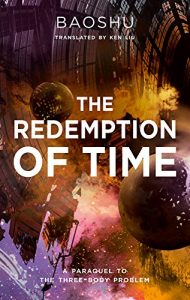 translated by Ken Liu
translated by Ken Liu
July 16, 2019
272 pages
**here be spoilers!
If you absolutely loved Liu Cixin’s Three-Body trilogy (The Three-Body Problem (2014), The Dark Forest (2015), and Death’s End (2016))–and of course you did–then you’ll be understandably excited to know that The Redemption of Time is available in just a couple of months and it is mind-bendingly fantastic. A huge thank-you also goes out to Ken Liu for his superb translation.
As a long-time fan of Liu Cixin’s work, Baoshu (a science fiction author in his own right) decided to write Three-Body fan fiction because he, like many others in China who read the trilogy, didn’t want the stories from this particular universe to end. Baoshu’s decision to follow Yun Tianming’s storyline, and also imagine completely alien civilizations, allows The Redemption of Time to stand alone as a remarkable work of Chinese science fiction and to fit perfectly into the universe that Liu Cixin so meticulously created.
The three parts of Redemption (a nod, perhaps, to the Three-Body Problem?) explore 1) Yan Tianming’s experiences once his brain was captured by the Trisolarans (told through a series of long conversations between Tianming and AA, the woman trapped in that miniverse with him); 2) Tianming learning from Sophon about the mysterious and powerful intelligences (the Master and the Lurker) that hold the fate of the grand universe in their hands and fight one another with threats of dimension reduction and reversal; and 3) how these intelligences trick one another into revealing the other’s location and thus opening themselves to destruction.
Remember that incredible scene in Death’s End when the Solar System was flattened? That fantastic and horrific image of each planet succumbing to a two-dimensional plane? Baoshu asks us to step back and survey the universe as a whole, with not just our galactic neighborhood but thousands or millions of others, all under the threat of dimension reduction and destruction. Why this dimensional mud-slinging, though? Because the Master wants to get back to the perfect ten-dimensional universe in which time didn’t exist, while the Lurker wants to move forward to the zero-dimensional universe where there is nothing but time. Baoshu draws on myths about the creation of the Earth to imagine this battle between a “mother” and her rebellious “son,” each struggling to attain their version of perfection with/without time.
Redemption is not so much a novel in which things happen as much as a deep reflection upon the meaning of time and how time shapes us and the universe(s) we inhabit. Baoshu devotes many pages to Yun Tainming, for instance, thinking back on the experiments that the Trisolarans did with his brain in order to learn how to deceive humans (since Trisolarans are incapable of deception). Some of Tianming’s “dreams” seemed to last thousands of years–an extreme example of how subjective time is in terms of the human brain. This novel is also a love story, though a complicated one, since Tianming’s love for Cheng Xin is ultimately displaced by his love for AA, who, in another incarnation, was his childhood friend.
The last chapter of Redemption, in which Baoshu imagines how the most infinitesimal change in the balance of energy in the universe will change history once the universe is “reborn,” resembles this author’s story “What Has Passed Shall in Kinder Light Appear” (Broken Stars, 2018). There, too, Baoshu imagines a slightly altered universe, one close enough to our own that we recognize it perfectly, but in which events are all in the “wrong” order, with dire consequences. So if you’re prepared to have your brain turned inside-out by miniverses and alternate history and time dilation, then you need to start reading The Redemption of Time yesterday. (see what I did there? 😉 )
